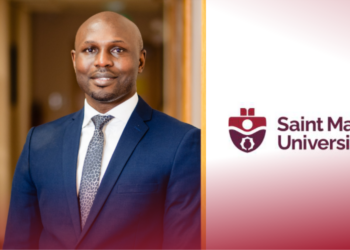Sir, who is Akintunde Sawyerr?
I’m a patriotic Nigerian in the first instance, who genuinely loves this country. I’m a family man. I have been in the corporate world before joining the government. This is my first government position, but before now I’ve worked in the corporate world for large corporations from the UK across Germany, Denmark, Switzerland and also the Middle East. I’ve also worked and lived in the United Arab Emirates and Saudi Arabia. I have a very diverse background in healthcare, healthcare education, logistics and supply chain, medical technology, agriculture, and now the one that encompasses all of those things, education. I had most of my education in the UK, went to boarding school in the UK at the age of 12, had all my education in the UK all the way through university. I attended the University of London and here I am today back in my own country trying to contribute my quota as a recognition of what Nigeria has done for me, which is not insignificant given that all my education was paid for by my parents’ earnings from Nigeria. So it’s payback time. Payback time for me.
Is there a student loan programme of another country that NELFUND is modelled on or is NELFUND entirely unique to Nigeria? And how is NELFUND addressing equity issues to ensure inclusivity for marginalized and underserved groups, including women, rural communities, and persons with disabilities?
Well, yes and no. I think this particular student loan programme is probably very similar to the one that they have in the UK. I think that’s probably the closest scheme that this one resembles. However, this also seeks to recognise the fact that there are many people who simply cannot afford to pay for their own education or whose parents can’t afford it and therefore there’s a high number of people who drop out before they can get to the tertiary stage. They simply can’t afford it. This is unique in the sense that the loans or the law behind it, allows the loans to be given on an interest free basis. On top of that, it also does not compel the borrower to have to pay back the loan unless they’re self-employed. The obligation or repayment of the loan is on the employer who only deducts 10% of the loanee’s wages or salary to pay back to the fund. In other words, the loanee is not criminalised at any stage for not being able to pay back and also they don’t have to pay back if they don’t have a job. That is the implication of saying the employer needs to pay it back. If you don’t have an employer, you can’t pay it back. The other thing I should mention is that there is a mandatory National Youth Service Corp scheme (NYSC) that every Nigerian graduate must undertake sometime after graduation. This scheme puts no reporting obligation for payback on the loanee until two years after completion of the NYSC, which makes it even longer in terms of giving them an opportunity to find a job before they even have to think about asking their employer to pay back on their behalf.
Subscribe To Unlimited Premium Digest.
This is premium content. Subscribe or Login to read the entire article.
Subscribe
Gain access to all our Premium contents.More than 1,000+ Articles, News, & Scholarships.





































































 EduTimes Africa, a product of Education Times Africa, is a magazine publication that aims to lend its support to close the yawning gap in Africa's educational development.
EduTimes Africa, a product of Education Times Africa, is a magazine publication that aims to lend its support to close the yawning gap in Africa's educational development.

